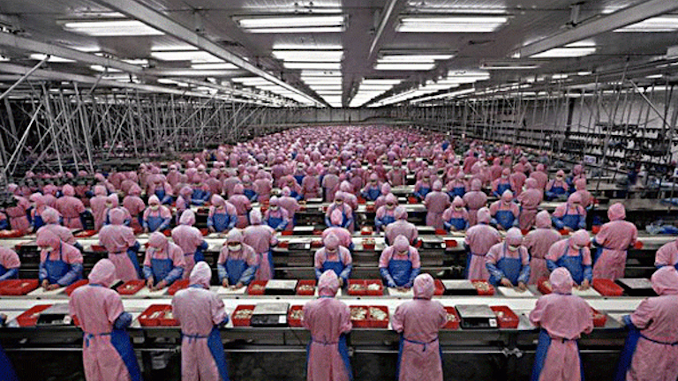
By Paul Craig Roberts
America can’t do without an enemy. An enemy is what funds America’s largest industry—military spending—and an enemy provides a national security focus which holds our tower of Babel together.
During the Obama regime Russia was re-established as The Enemy. Trump’s intent to normalize relations with Russia, that is, to erase Russia’s enemy status, brought fire and brimstone down on his head from the military-security complex. The CIA director actually denounced the elected American president as a traitor. The defeated Democrats, seeing the formidable military-security complex aligned against Trump, jumped in to recover their political loss by concocting “Russiagate.” Trump survived, but lost three years of his first term to a hoax created to drive him from office.
In Trump’s fourth year, the enemy has been relocated. Now it is China. Several developments contributed to changing the enemy to China. One was China’s growing willingness to stand up to Washington’s provocations and to speak back. One was Washington’s need for someone to blame for America’s large trade deficit. Another was the realization of China’s manufacturing and industrial prowess and the leadership China is taking in technology as exemplified by Huawei’s lead in 5G. Disturbed U.S. communications technology companies, neoconservative hegemonic ambitions, and prospects for more military spending to contain China were given lobbying power by Trump’s verbal fight with China. These conflicts were given more potential by the rise of Covid-19 blamed on China.
A senator and right-wing radio speak of Washington making China pay for the cost of Covid-19 to the U.S. by reneging on U.S. Treasury debt obligations to China. It is hard to imagine a more stupid or implausible idea. As China could simply sell the bonds into the international market, Washington would need a list of identification numbers on China’s holdings and post them as instruments on which interest and principle would not be paid. As treasuries are bought and sold in the market, it is not clear that the U.S. Treasury knows who holds which bonds.
Assuming this scheme could be successfully implemented, the problems begin. Reneging on debt is the practice of third world countries. If the U.S. adopts this practice, other countries will wonder if their holdings are next. The market for treasuries could disappear, leaving the Federal Reserve as the only purchaser. There would be no point in issuing bonds. Money would be printed to finance the deficit.
This, in turn, could affect the willingness of other countries to hold dollar-denominated assets such as equities. This would have negative effects on the stock market. The U.S. dollar could lose its role as world reserve currency, which would mean that Washington could no longer pay its bills by printing money.
Additionally, China has a range of retaliatory measures. The production facilities of many U.S. corporations, such as Apple, are located in China. China is the favored location for the offshored production of U.S. corporations. These facilities could be nationalized. In a number of cases the production facilities are not owned by the U.S. firms. Instead, the U.S. firms contract out their production to Chinese firms. China could stop the production of the products for U.S. firms, steal the patents or brand name, or simply continue the production and re-brand it as a Chinese product. As the U.S. does not respect laws of other countries or international law, there is no reason for China to respect U.S. law.
The Chinese have mistakenly purchased a number of assets within the U.S. If the values of these assets equal or exceed the U.S. assets located in China, the retaliatory policy would not pay for China.
When it comes to law, the U.S. does not play fair. Washington has tried to hamstring Huawei by blacklisting the company and by pressuring NATO allies to reject Huawei technological products such as 5G. This policy has probably done more harm to U.S. semiconductor corporations than to China, as it has complicated U.S. sales of chips to Huawei.
Washington’s effort to constrain Huawei’s international business also comprises an attack on the supply chains of global manufacturing, which has to displease first world global corporations. It assaults the idea of global dependence.
The U.S. trade deficit with China is not China’s fault. It is the fault of the global U.S. corporations that offshored their production to China. When the offshored products, such as Apple computers and iPhones, are brought back to the U.S. for sale, they count as imports. Thus, it is U.S. firms such as Apple, Nike, and Levi that are responsible for the U.S. trade deficit, a responsibility shared by neoliberal economists who tauted globalism, which has come at the expense of first world work forces.
Globalism gave China its manufacturing base. China should use this base to develop its massive consumer market. It is not globalism that any longer serves China’s interest. With the largest consumer market in the world, China should shift its focus to internal development. The internal market is so vast that exports should be of no concern to China. China, awash in U.S. dollar reserves that Washington threatens to disavow, has no need for foreign reserves. China’s strength is in her economy. This strength should be developed. The intelligent path for China is to throw away neoliberal junk economics and develop a Chinese economy.
This was the American way during the first half of my life. The U.S. economy was so large that U.S. firms were awash in profits without recourse to sales abroad. Producing domestically for domestic consumption meant that high value-added, high-productivity jobs remained in the U.S. where they fueled the growth of real income that guaranteed a rising aggregate demand, which supported a growing economy and ladders of upward mobility. Once offshoring began, these ladders were dismantled, and today the result is that American consumers lack the income growth to drive the economy.
China has won from globalism while America has lost. To avoid the American decline, China needs to cash out of globalism and construct its domestic economy. Not only would this be very advantageous for China, it would benefit the cause of peace by reducing points of conflict between the U.S. and China.



Well, America is a quite young nation The country of modernity and technical progress and liberal free market economy, so to say. And so it has no mythology – and that is why for example the comics and comic culture exist. This is the symbolism and are the symbols and symbolics of American mythology. Also see alternative archaeology like David Hatcher Childress and R. Cedric Leonard and Charroux and Graham Hancock and Bauval and Helge Wirth and Dominique Görlitz and James DeMeo and Prof. Margrit Kennedy and the anthropologist David Graeber and the international Nexus-Magazine about it.
I’m no economist, but it seems to me that the US should take the advice Dr. Paul Craig Roberts offers to China. It would seem that an American national economics would require serious de-coupling from China, regardless of the wisdom (or lack of it) of just reneging on bonds. Meanwhile, China is bent on global domination and this fact means that China IS an enemy, not some fictitious adversary dreamed up by a money-hungry military. This situation is another reason why the US needs to work towards decoupling from China, PARTICULARLY in the high-tech sphere (Hua Wei and China-made 5G for example) which Beijing will use for espionage and control of the US. “US not playing fair with Hua Wei”? Well, Hua Wei, controlled by China’s military, is not an innocent phone manufacturer and it is good that the US government has finally begun to take some steps away from them. But much more needs to be done.
“To avoid the American decline, China needs to cash out of globalism and construct its domestic economy. Not only would this be very advantageous for China, it would benefit the cause of peace by reducing points of conflict between the US and China.”
This might be wise advice, not to follow the US path. But history shows the challenge of the task. If China was to retreat from globalism it might be seen as weakness by the West, and the process of destabilizing it to open its economy as in the 19th century would begin again.
https://www.ghostsofhistory.wordpress.com/
SO WHERE WOULD THAT LEAVE THE WEST?